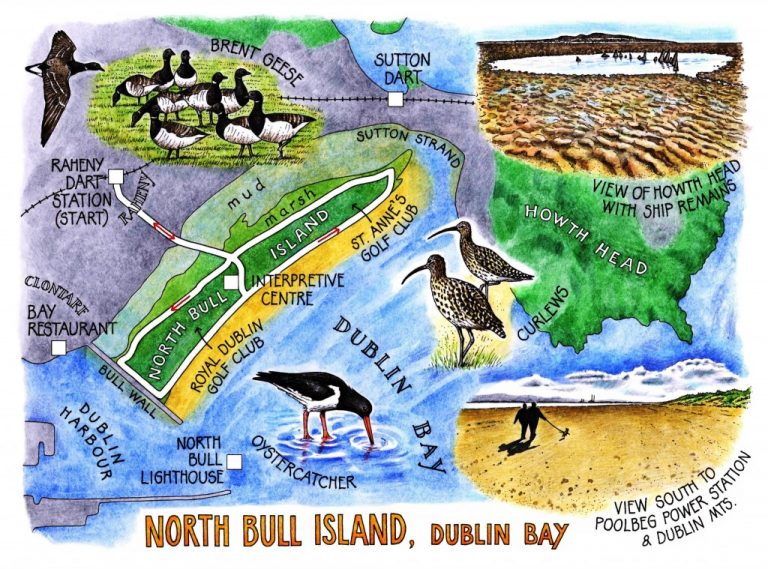Irish Independent Walk of the Week Christopher Somerville
2 April 2011
No 90: North Bull Island, Dublin Bay

North Bull Island lies low off the coast road north of Dublin between Clontarf and Sutton – so low that a casual driver with the morning sun in his eyes and too much on his mind might miss it altogether, or dismiss it as a mess of mud and wasteland. But look down from between the outspread wings of your imagination, and you’ll see what OS Discovery Sheet 50 depicts – a great sandbank three miles long, shaped like a rather benign-looking shark swimming north-east with its mouth open to grab a bite out of the isthmus between Howth and the mainland. The shark’s belly is pure yellow sand, its back and dorsal fin green marshland. Mountaineers setting out to climb to the summit of Bull Island need neither oxygen nor Sherpas to help them: the highest point is a less-than-lofty thirteen feet.
North Bull Island is many things to many folk. To naturalists and biologists it’s a wonderland, a wildlife paradise that’s laden with designations: an EU Special Protection Area, a National Nature Reserve and a UNESCO biosphere reserve of world significance for its birds, its flora and insect life. To members of the St Anne’s and Royal Dublin Golf Clubs, cheek by jowl on the island, it’s a fairway to heaven. To runners, dog-wranglers, kiters and walkers it’s one of the breeziest, most beautiful places anywhere in Greater Dublin to get some fresh air and let your blues float out to sea.
On a gorgeous sunny afternoon Jane and I set out from Raheny DART station and were soon down on the shore and crossing the causeway onto North Bull Island. Out on the beach we let the south wind push us briskly up the ribbed sands, crunching over razor shells and cockles. Ahead the dark heather-coated hummock of Howth Head rose across the neck of Sutton Strand. Pale marram grass, buzz-cut by winter frosts, cloaked the dunes behind the beach. The marram’s enormously long roots, netted out of sight, hold the structure of North Bull Island together. The island had existed for centuries as a sandbank in Dublin Bay, and a great nuisance to shipping, before the North Bull Wall was built in 1820-5. After that the sandbank consolidated in the tangly grip of the marram, and the island came into being.
The glorious wild flowers of North Bull Island’s lime-rich dunes – the bee and pyramidal orchids, the sulphurous yellow rattle and rare lipstick-pink lesser centaury – were still tucked away in late winter modesty. But the birds were another matter. On the tideline herring gulls and hooded crows scavenged among delicately stalking curlews. On the landward side of the point the outgoing tide moved along its creeks like mercury slipping out of a thermometer, exposing acres of stony mud where oystercatchers dipped heavy orange beaks among the shellfish, and chestnut-and-white shelduck hoovered for marine snails with sideways sweeps of their sieve-like bills.
The stars of the show were the pale-bellied brent geese, itching for their imminent spring flight to their breeding lands in Greenland, or maybe even further off in Canada, but not quite ready for departure just yet. As we took the southward marsh path along the inner shore of North Bull Island, flight after flight came skimming low across the pale blue silhouettes of the Wicklow Hills, each bird braking with downward wings before bouncing in to land with a shiver and shake of plumage. They crowded the creek edges in a black and white mass, heads down as they cropped the zostera marina eelgrass. They thronged the golf club greens. You couldn’t imagine a more dramatic and seductive sight and sound.
‘Ye can shoot the feckin’ things and welcome!’ offered a disgruntled player, wiping goose-gubbins from his cleated shoes. There’s no pleasing some folk, eh?
WAY TO GO
Map: OS of Ireland 1:50,000 Discovery 50
TRAVEL: DART (irishrail.ie) to Raheny
Bus: 130 (dublinbus.ie)
Road: R105, Dublin-Sutton; turn right opposite Watermill Road.
WALK: From Raheny DART station, turn right; across traffic lights; at next lights, left down Watermill Road for ½ mile to seafront. Cross onto North Bull Island; ahead to Interpretive Centre and beach. Left or right to make a circuit of the island – along the strand on seaward side, along path between marsh and golf courses on landward side.
LENGTH: 7 miles circuit (3 hours); add 3 miles there-and-back from Raheny DART station.
CONDITIONS: Level, firm strand walking and marsh path.
DON’T MISS
• Interpretive Centre information and displays
• Bird life of strand and marsh (bring the binoculars!)
• Great views of Howth Head, Dublin port and hills
REFRESHMENTS: The Bay, Clontarf (01-853-2406; bay.ie) – great food, right on the waterfront
ACCOMMODATION: Trinity Capital Hotel, Pearse Street, Dublin 2 (01-648-1074; trinitycapitalhotel.com): flamboyant and very comfortable; 2 mins walk from Pearse Station.
BULL ISLAND INTERPRETIVE CENTRE: 01-833-8341; open Mon-Thurs 10.15-1, 1.30-4; Fri 10.15-1.30.
Walking groups: Contact Interpretive Centre to arrange a talk on the habitat and wildlife of Bull Island.
GUIDEBOOK: Walking Dublin – 24 walks in and around Dublin by Pat Liddy (Globetrotter)
Pat Liddy’s guided walks: 01-832-9406 or 087-905-2480; walkingtours.ie
WALKING in IRELAND: Walking tour operators, local walks including Discover Ireland’s National Loop Walks, walking festivals throughout Ireland: www.discoverireland.ie/walking.
Tinahely Trailwalking Festival, Co. Wicklow, May Bank Holiday 2011: www.tinahely.ie
Millstreet Hillwalking Festival. Co. Cork, 9-10 April: contact Michael Thornton on 086-172-1142; http://walkersassociation.ie/node/35797
or http://www.millstreet.ie/blog/category/living/hill-walking
NB New ‘Walk Safely’ leaflet (Mountaineering Ireland & Fáilte Ireland) from TICs or info@mountaineering.ie (01-625-1115); download from www.mountaineering.ie.
csomerville@independent.ie